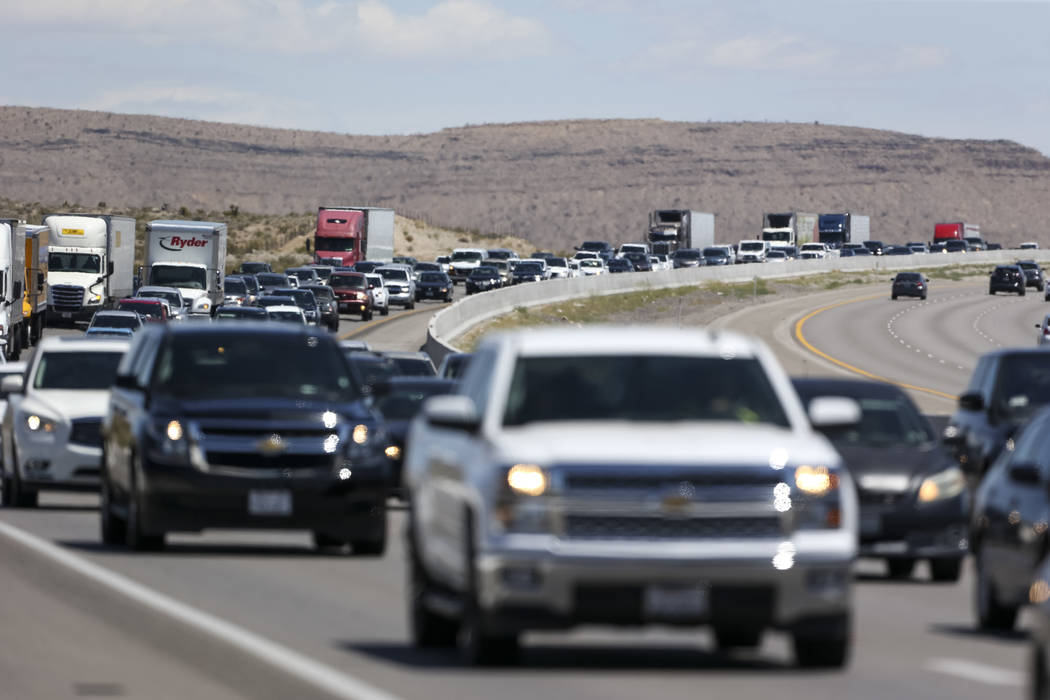
With schools nearing the end of the academic year, the summer travel season is about to heat up along with the weather.
Before families set out on road trips full of bathroom breaks and the inevitable onslaught of “Are we there yet?,” motorists should ensure that their vehicles are ready for summer travel.
“The desert heat is relentless, especially on our vehicles,” AAA Nevada spokesman Sergio Avila said. “Car batteries, engine cooling systems and tires are all susceptible to breaking down during your summer road trips. The worst way to spend your hard-earned time off is on the side of the road. Many of those types of breakdowns are preventable if drivers take the time to inspect their vehicles. Just think of it as added peace of mind.”
Motorists should not only prepare their vehicles for travel but also be sure to have various items on hand in case of an emergency, Avila said.
Here are some important tips from AAA that will help you get on your way:
Keep your engine cool
Motorists are urged to have their vehicle’s coolant systems flushed periodically, as recommended by the vehicle manufacturer.
Between flushes, it’s vital to ensure that the coolant is filled to the proper levels by checking the overflow reservoir and topping off the reservoir with a 50/50 mix of water and coolant of the type specified by the vehicle manufacturer, if needed.
Never remove the radiator cap when the engine is hot. Boiling coolant under pressure can cause serious burns.
Rubber cooling system components are vulnerable to heat-related deterioration, so regularly inspecting hoses and drive belts for cracking, soft spots or other signs of poor condition is also recommended.
Keep tires properly inflated
Underinflation can cause tires to overheat and increase the chances of a blowout, especially during the summer months, when road temperatures are extremely high.
Checking your car’s tire pressure, including that of your spare tire, is recommended at least once a month, because tires lose about one pound of pressure per month on average through normal seepage.
Checking pressure when tires are cold is recommended. Always follow the inflation recommendations in the vehicle owner’s manual or on the tire information label either in the glove box or on the driver’s door jamb.
Using the inflation pressure molded into the tire sidewall is not recommended, as it may not be the correct pressure for a particular vehicle.
Keep fluids at appropriate levels
The majority of engine fluids lubricate and serve as coolants by helping carry heat away from critical components. Keeping fluid levels at recommended levels decreases the possibility of overheating and other preventable engine issues.
Regularly checking all fluids — including motor oil, transmission fluid, power steering fluid and brake fluid — is important, even if a vehicle’s dashboard gauge doesn’t indicate that any maintenance is needed. If any fluids need to be topped off, use the type of fluid specified in the owner’s manual.
Keep a comfortable driving environment
Ensuring that the driver is comfortable is key during road trips, as he or she is vital to a safe, enjoyable trip.
A properly functioning air conditioning system can be more than just a convenience, especially in the high summer temperatures seen in the region.
A comfortable climate inside a vehicle can help reduce fatigue, playing an important role in driver alertness and vehicle safety.
If a vehicle’s air conditioning is not maintaining the interior temperature, the refrigerant level may be low, or another problem could be present. AAA reps recommended having the system checked by a certified technician.
In vehicles with cabin filters, the filters should be inspected regularly and replaced as needed to ensure maximum airflow and cooling during the summer months.
Be prepared
Though no one envisions having the vehicle break down on a trip that’s planned for leisure, planning for the unexpected is a must.
Even with preventive maintenance, summer breakdowns can still occur, so AAA recommends that drivers have a well-stocked emergency kit in their vehicles.
All kits should include water, nonperishable food items, jumper cables, a flashlight with extra batteries, road flares or an emergency beacon, basic hand tools and a first-aid kit.
So before you hit the road this summer, make sure you and your vehicle are ready for the adventure so that rambunctious children are the only hazard you encounter on your journey.
“Life happens, and cars break down. Sometimes it’s unavoidable,” Avila said. “These items could literally be a lifesaver during the height of the desert heat.”